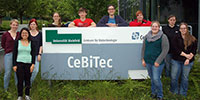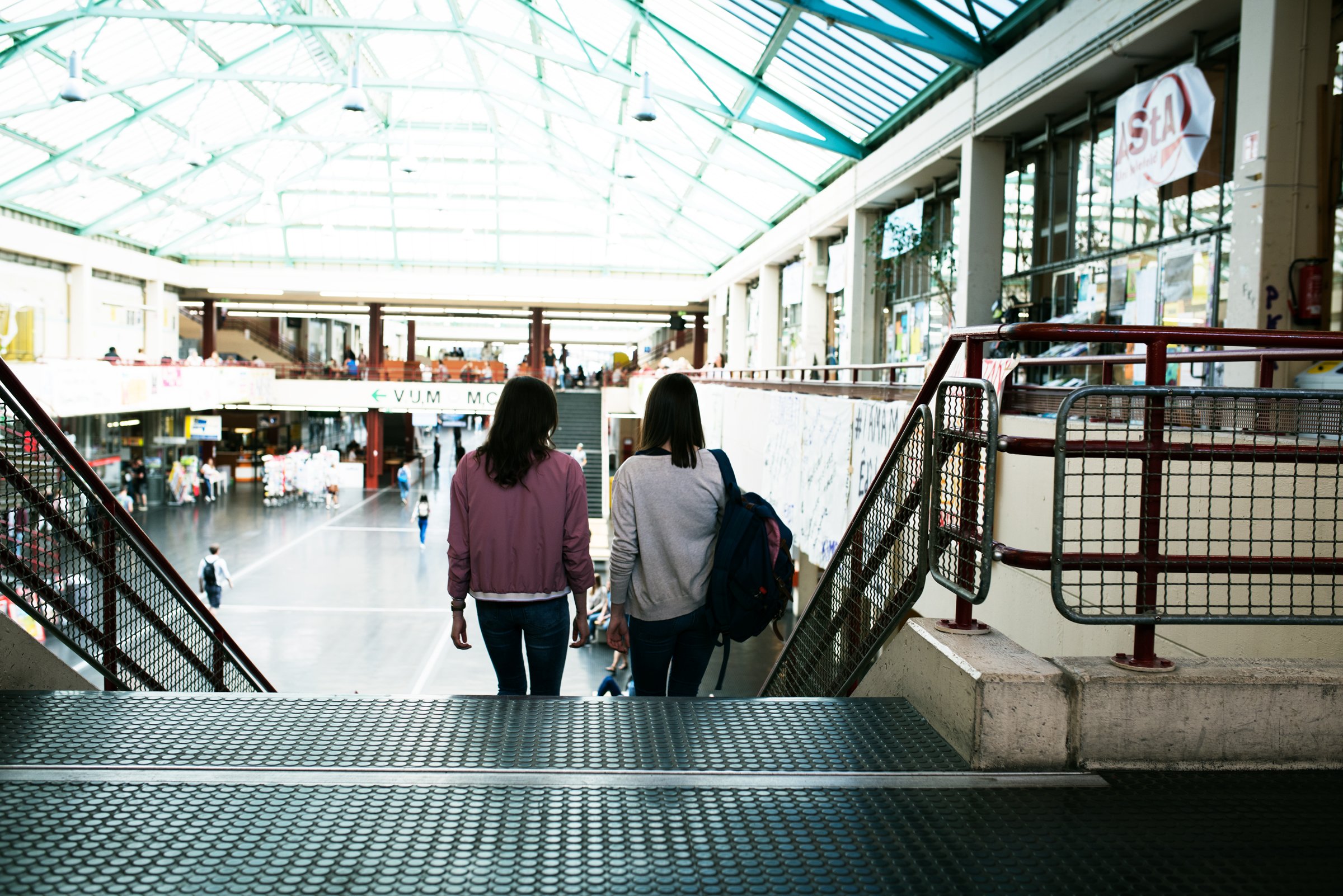Bielefeld Students Develop Rapid Tests to Test Drinking Water Quality
Published on 27. Juli 2015, 09:08 h
In Boston, the iGEM team will compete with this research project against universities from around the world
What am I actually drinking here? Is my drinking water contaminated with heavy metals? Or can I test if my drink has been laced with knock-out drugs? Ten students from Bielefeld University are working on developing test strips that would allow anyone to quickly test the quality of their drinking water or drink. With this research project, the student team will compete at this year’s iGEM competition in Boston, USA. iGEM stands for “international genetically engineered machine” and is the most important student competition in synthetic biology. From 24-28 September in Boston, the team will present their findings and compete against other research projects by teams from universities around the world.
 Contaminated drinking water can be a problem not only in developing countries, but also in our own backyard. Knowing what is in the water, and whether it is safe to drink, can be crucial for survival in some cases. A test strip that is as simple to read as a barcode, for example with a Smartphone app, could be a solution to the problem. “Such a testing system could prove beneficial in crisis zones, for instance places that have experienced flooding or an earthquake. Emergency responders should be able to test whether the drinking water in the area is dangerous for the people using an easy, quick, accurate, and cheap method, which will then enable them to take additional measures as necessary,” explains iGEM member Luzia Buchholz.
Contaminated drinking water can be a problem not only in developing countries, but also in our own backyard. Knowing what is in the water, and whether it is safe to drink, can be crucial for survival in some cases. A test strip that is as simple to read as a barcode, for example with a Smartphone app, could be a solution to the problem. “Such a testing system could prove beneficial in crisis zones, for instance places that have experienced flooding or an earthquake. Emergency responders should be able to test whether the drinking water in the area is dangerous for the people using an easy, quick, accurate, and cheap method, which will then enable them to take additional measures as necessary,” explains iGEM member Luzia Buchholz.
Since January, the ten students and Professor Dr. Jörn Kalinowski have been working on this topic and since April, they have been working in the lab to develop various approaches using different technologies. Based on well-researched bacteria, such as the widespread Escherichia coli, the team wants to formulate a solution that can be put on paper and frozen. In this form, the solution can be stored for a long time and can be reactivated by adding water. This system has the benefit of not using any live bacteria, and thus it does not pose a danger to the environment. Another technology provides a test-strip based system that is based on the interplay of proteins and DNA. In both methods, when a water sample is put in the system, a color signal is shown that indicates whether the water contains a substance, as well as what that substance is. “Our first positive results give us reason to hope that the system could quickly be made available for use,” says Professor Dr. Kalinowski.
The test is designed to check for both heavy metals as well as chemicals, such as those in knock-out drug drops. The unique feature about the heavy metal test is that it is designed to test for several heavy metals at the same time. “Such a simple test that can be used by anyone to test for many potentially dangerous substances has not yet been shown at iGEM,” says team member Linh Ho.
 The new testing strips could also be used to test one’s own drink for knock-out drugs, such as at public events or the bar. “Testing for the kinds of substances that may be in knock-out drops has to this point been very expensive, and only performed for suspected cases in specially equipped laboratories. Most importantly, this type of testing does not prevent someone from consuming a drink laced with the drug. Our test strips could change this,” explains iGEM member Janina Lüders, pointing out the potential uses for the testing system. “The test could also assist medical professionals in their work, since it indicates quickly and accurately whether the sample contains a dangerous substance. We are already in contact with a local hospital to gather input from experts.
The new testing strips could also be used to test one’s own drink for knock-out drugs, such as at public events or the bar. “Testing for the kinds of substances that may be in knock-out drops has to this point been very expensive, and only performed for suspected cases in specially equipped laboratories. Most importantly, this type of testing does not prevent someone from consuming a drink laced with the drug. Our test strips could change this,” explains iGEM member Janina Lüders, pointing out the potential uses for the testing system. “The test could also assist medical professionals in their work, since it indicates quickly and accurately whether the sample contains a dangerous substance. We are already in contact with a local hospital to gather input from experts.
iGEM is a competition in the area of synthetic biology held in Boston, USA, where the Bielefeld team will compete with other universities from around the globe. The competition is in its eleventh year, and over 250 teams will take participate. Bielefeld University has competed in iGEM since 2010 and has already won the runner-up world champion title and different special prizes, along with a gold medal each year.
The Bielefeld team is made up of students from the master’s degree programme in “Molecular Cell Biology, Genome-Based Systems Biology and Molecular Biotechnology.” They are working together on the project with CeBiTec (Center for Biotechnology), which is located at Bielefeld University. In addition to laboratory work, CeBiTec also provides sponsoring, public relations, and modeling.
More information is available online at:
www.igem-bielefeld.de
http://2015.igem.org/Team:Bielefeld-CeBiTec
Contact:
Prof. Dr. Jörn Kalinowski, Bielefeld University
Member of the Board, Center for Biotechnology – CeBiTec
Telephone: 0521 106-8756
Email: joern@cebitec.uni-bielefeld.de or info@igem-bielefeld.de
What am I actually drinking here? Is my drinking water contaminated with heavy metals? Or can I test if my drink has been laced with knock-out drugs? Ten students from Bielefeld University are working on developing test strips that would allow anyone to quickly test the quality of their drinking water or drink. With this research project, the student team will compete at this year’s iGEM competition in Boston, USA. iGEM stands for “international genetically engineered machine” and is the most important student competition in synthetic biology. From 24-28 September in Boston, the team will present their findings and compete against other research projects by teams from universities around the world.
The iGEM team is developing rapid tests that would allow anyone to test whether there are knock-out drugs in their own drink: Mar-ta Eva Jackowski, Uyen Linh Ho, Janina Lüders, Ursela Barteczko, Tobias Vornholt, Alexander Gräwe, Anna Dreyer, Luzia Buchholz, Melissa Kracht, Gila Drews (from left).
Photo: Team iGEM Bielefeld-CeBiTec 2015
Since January, the ten students and Professor Dr. Jörn Kalinowski have been working on this topic and since April, they have been working in the lab to develop various approaches using different technologies. Based on well-researched bacteria, such as the widespread Escherichia coli, the team wants to formulate a solution that can be put on paper and frozen. In this form, the solution can be stored for a long time and can be reactivated by adding water. This system has the benefit of not using any live bacteria, and thus it does not pose a danger to the environment. Another technology provides a test-strip based system that is based on the interplay of proteins and DNA. In both methods, when a water sample is put in the system, a color signal is shown that indicates whether the water contains a substance, as well as what that substance is. “Our first positive results give us reason to hope that the system could quickly be made available for use,” says Professor Dr. Kalinowski.
The test is designed to check for both heavy metals as well as chemicals, such as those in knock-out drug drops. The unique feature about the heavy metal test is that it is designed to test for several heavy metals at the same time. “Such a simple test that can be used by anyone to test for many potentially dangerous substances has not yet been shown at iGEM,” says team member Linh Ho.
These rapid tests for drinking water use color signals to indicate which substances the water sample contains. Photo: Evgeny Borisov
iGEM is a competition in the area of synthetic biology held in Boston, USA, where the Bielefeld team will compete with other universities from around the globe. The competition is in its eleventh year, and over 250 teams will take participate. Bielefeld University has competed in iGEM since 2010 and has already won the runner-up world champion title and different special prizes, along with a gold medal each year.
The Bielefeld team is made up of students from the master’s degree programme in “Molecular Cell Biology, Genome-Based Systems Biology and Molecular Biotechnology.” They are working together on the project with CeBiTec (Center for Biotechnology), which is located at Bielefeld University. In addition to laboratory work, CeBiTec also provides sponsoring, public relations, and modeling.
More information is available online at:
www.igem-bielefeld.de
http://2015.igem.org/Team:Bielefeld-CeBiTec
Contact:
Prof. Dr. Jörn Kalinowski, Bielefeld University
Member of the Board, Center for Biotechnology – CeBiTec
Telephone: 0521 106-8756
Email: joern@cebitec.uni-bielefeld.de or info@igem-bielefeld.de
Posted by NFrei
in General
Kommentare:
Contact
Universität Bielefeld
Medien & News
Postfach 10 01 31
33501 Bielefeld
E-Mail:
medien@uni-bielefeld.de
